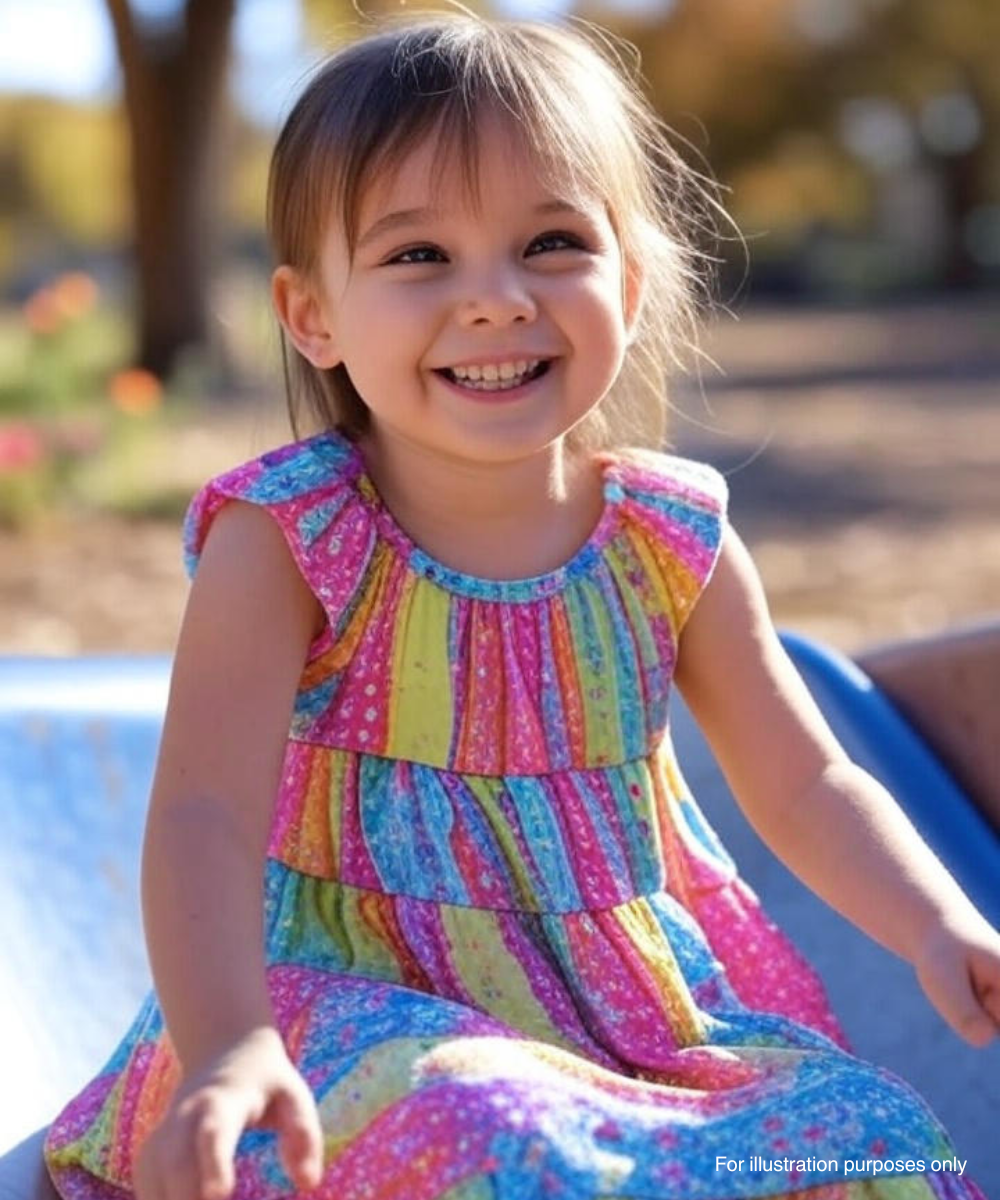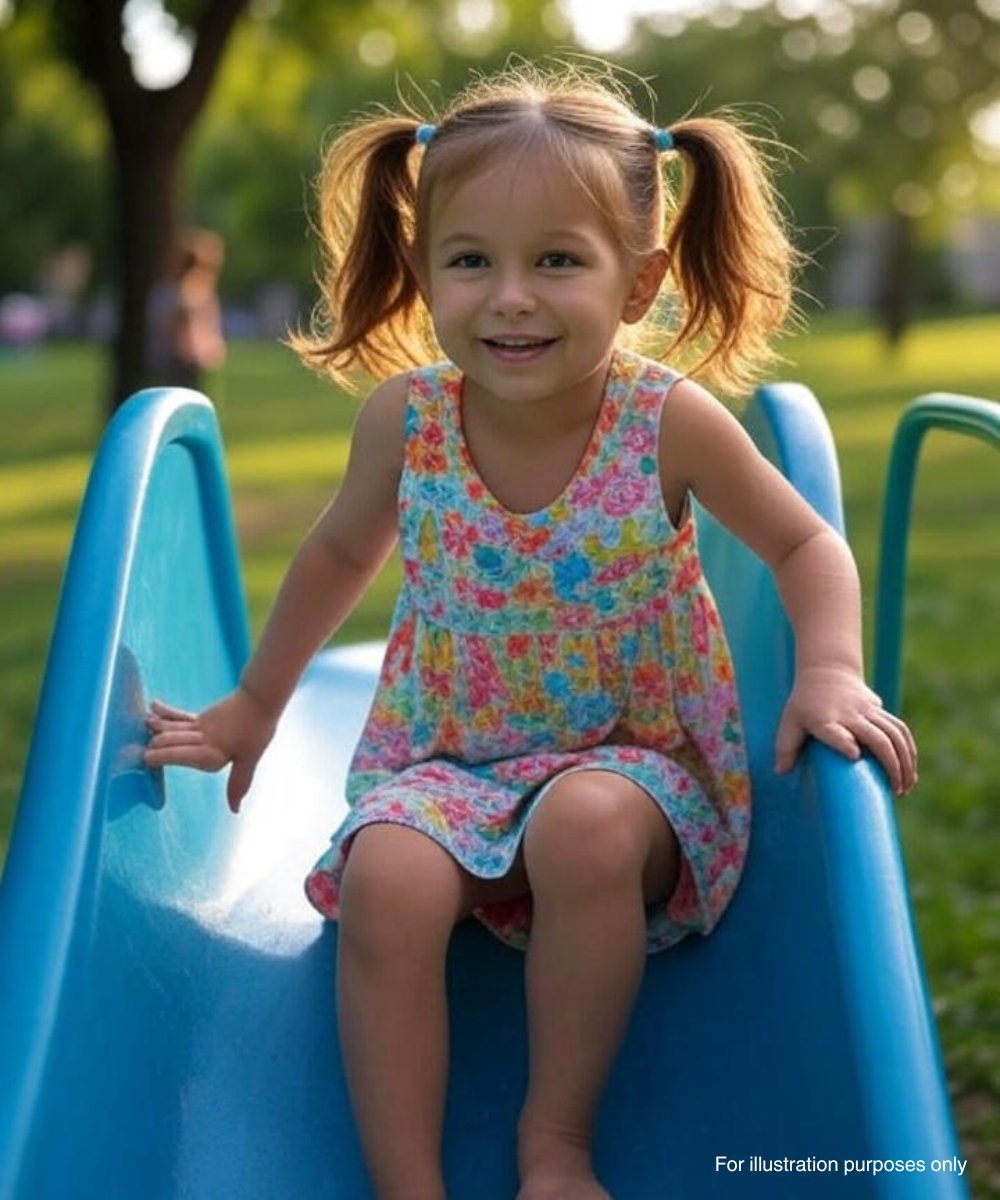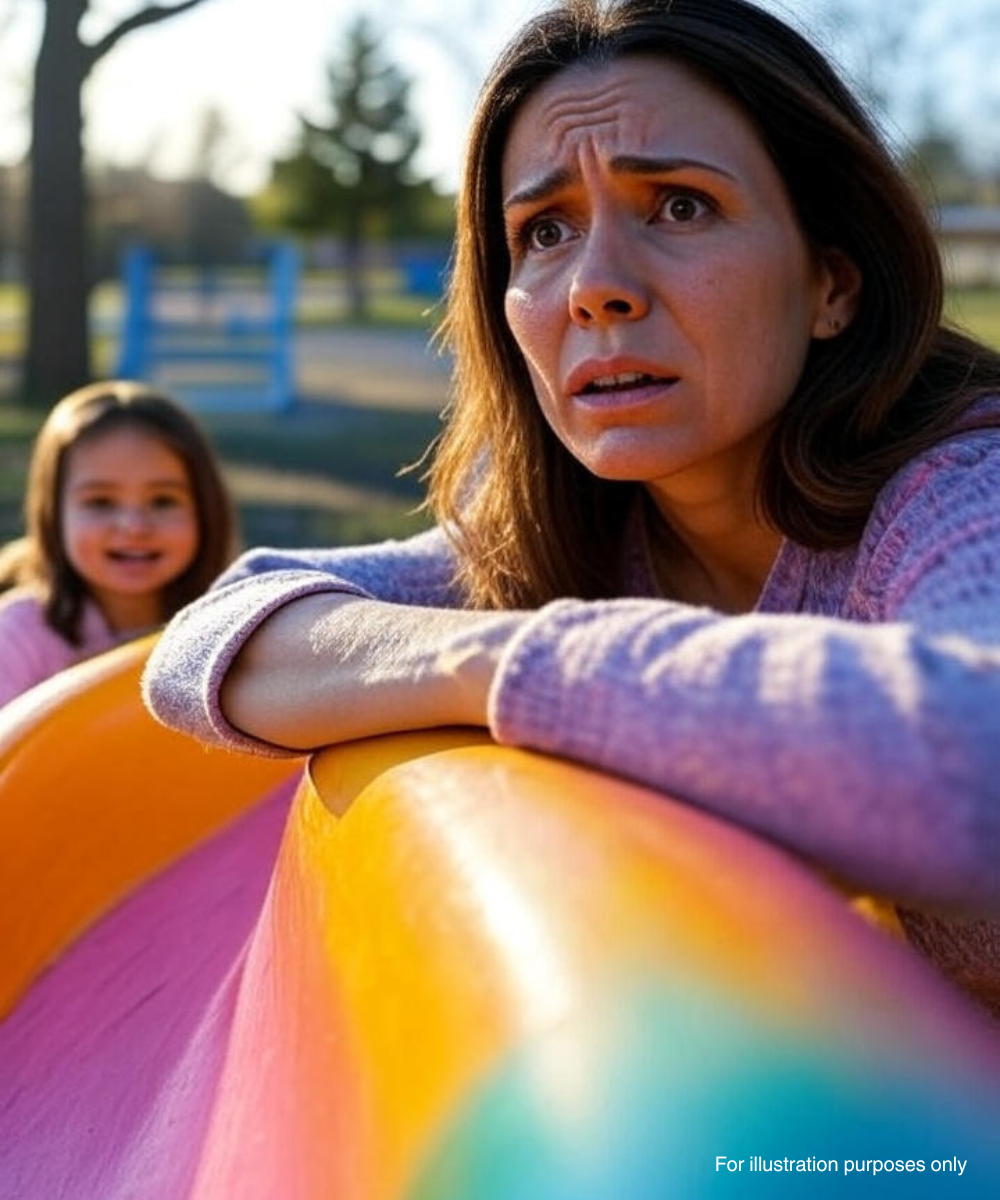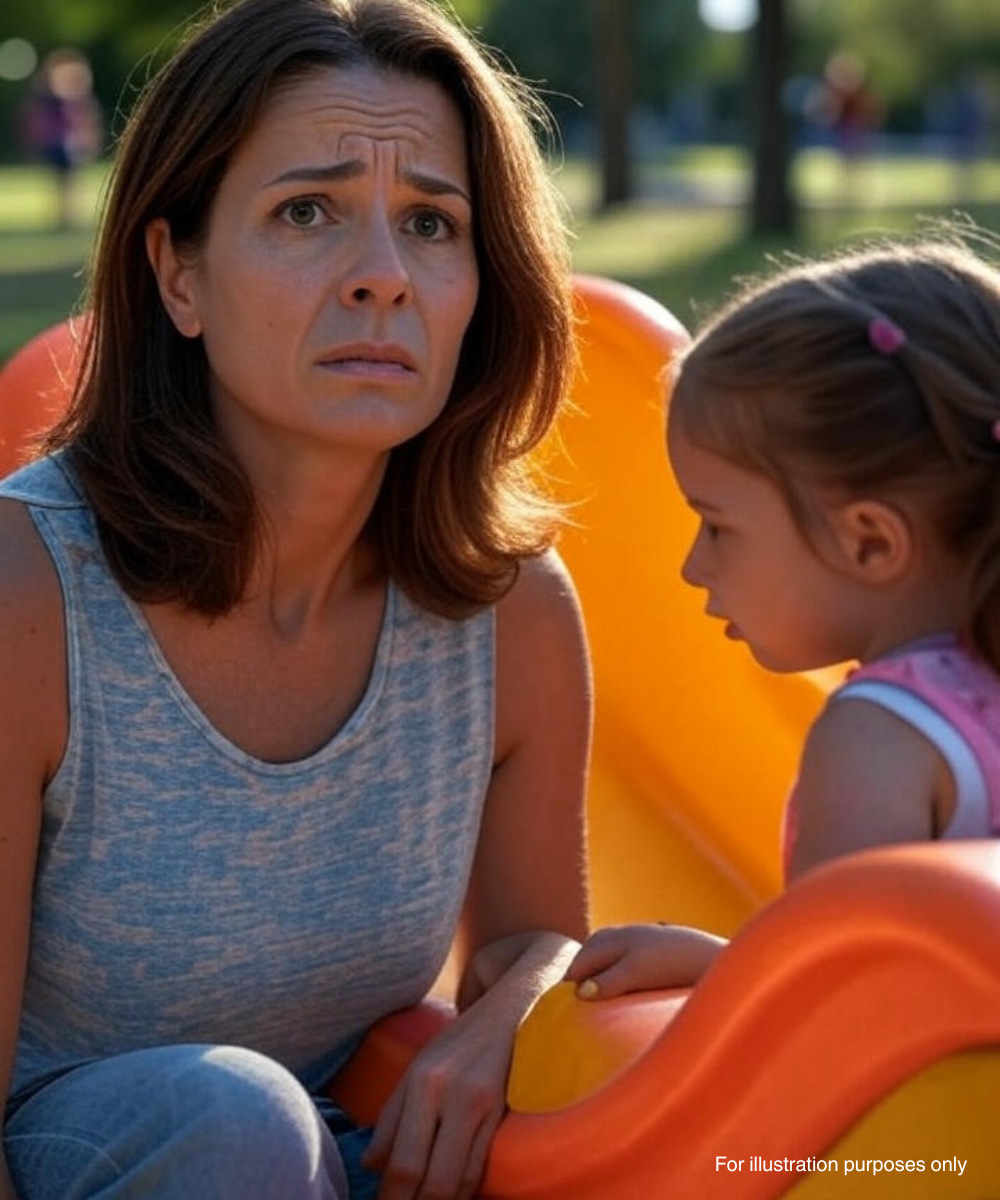The photo looks ordinary.
A kid on a slide. Lopsided ponytail. Shirt riding up. Bark chips in her pink sneakers. The kind of picture you’d scroll past in a heartbeat—unless she was yours.
Unless you knew the weight behind that smile.
I remember exactly what I was thinking when I took it:
Please, just let her feel normal for five minutes.
Because most days, I can’t go five minutes without worry.

My daughter has a rare chromosome duplication. Not fatal. But enough to make milestones feel like marathons. She didn’t walk until three. Her speech is a patchwork of sounds and signs that only we can understand.
So that day, when she climbed the ladder to the slide all by herself—slow, wobbly, determined—I nearly cried.
But then I saw her.
Across the playground, a mother was watching.
Not unkindly. But with that tight, practiced smile I know too well.
It’s the smile that says, I see you. And I’m glad I’m not you.
She didn’t look away when our eyes met. Just gave me a small nod.
The kind that’s supposed to mean You’re strong. You’re doing great.
But I didn’t feel strong.
I wanted to scoop my daughter off that slide and run—home, where no one stares. Where no one mishears her speech and frowns in confusion. Where no one calls her “weird.”
Suddenly I was spiraling.
Thinking about the birthday parties she never gets invited to. The kids who ignore her hellos. The cousins who avoid her during family gatherings because they don’t understand her.
But just then, I looked back up—and saw her giggling.
Pants twisted sideways. Bark chips in her mouth. Pure joy lighting up her face.
She didn’t need to feel normal.
She was happy.
And I needed to remember that.
I snapped the photo.
We left not long after. She got tired, as she often does, and I carried her to the car. She hummed something that sounded like Twinkle Twinkle, tapping a beat on my shoulder the whole way home.
That night, I posted the photo to my private Facebook.
Caption: “She did the slide all by herself today. Big moment.”
Family reacted with hearts and crying emojis. Friends left kind comments.
But then—something unexpected.

A message. From a mom I barely knew. Jenna.
Our kids had once gone to the same preschool, briefly. Her son, Eli, was a tornado of energy and scraped knees.
Her message said:
“Hey. I saw your post. I was at the park today too. I was the one watching. I hope I didn’t make you feel weird. I wanted to say something… your daughter was amazing.”
I blinked.
That was her?
I had assumed the worst—that her nod meant pity. But maybe… I was wrong.
I replied, “Thank you. Honestly, I thought you were judging me. I really appreciate your message.”
She responded almost instantly:
“Not judging. Remembering. My younger brother had the same chromosome duplication. He passed away when I was 19. Seeing your daughter reminded me of him.”
My throat tightened.
We talked more that night. Nothing heavy. She told me her brother loved trucks and hated peas. I told her my daughter loves sea turtles and signs “more” every time I play her favorite song.
That message became a friendship.
And one morning, she invited us to a small backyard playgroup.
“No pressure,” she said. “Safe space. Goldfish crackers and bubbles. That’s it.”
I hesitated. My fear screamed louder than my hope.
Would the other moms judge us? Would my daughter feel overwhelmed?
But we went.
And it was… simple.
Peaceful.
A blanket on the grass. Bubbles floating in the sun. Kids running. Laughter.
My daughter sat quietly, scooping gravel into a cup like it was buried treasure. No one pushed her aside. No one stared.
Then—a curly-haired girl approached and offered her a yellow plastic dinosaur.
My daughter stared at it for a moment. Then whispered: “Rawr.”
And they both giggled.
That tiny sound broke me.
I cried.
Sunglasses on, pretending it was allergies.
Jenna sat beside me. “He never had many friends either,” she said softly.
“Neither does she,” I whispered.
She nodded. “It only takes one.”

That was the beginning.
The playdates became weekly. Then twice a week. My daughter began recognizing Jenna’s house, her little legs kicking excitedly as we pulled into the driveway.
She was changing. Opening. Reaching for the other kids instead of hiding behind me.
And so was I.
Then one day, Jenna asked, “Have you thought about re-enrolling her in preschool?”
I froze. “I don’t think she’s ready. What if she can’t keep up? What if the teachers don’t have the patience?”
Jenna didn’t argue.
She just said, “What if one of the other kids needs to learn patience? And she’s the one who teaches them?”
That stuck with me.
A week later, I visited the preschool we’d left months ago. The director remembered us. She smiled when she saw my daughter, who walked up and touched a rainbow painting on the wall. She smiled, too.
We said yes.
The first days were hard. She cried when I left. I cried in the parking lot.
But the updates came—photos of her painting, stacking blocks, sitting beside another child who read her a book.
And then—another twist.
Two weeks later, Jenna called. Her voice shaking.
“They think Eli might be on the spectrum. He’s not talking in full sentences. His motor skills… They’re recommending evaluations.”
My heart dropped.
She had been my rock. Now it was her turn to be scared.
So I held her hand. I walked her through IEP forms. Shared sign language videos. Let her cry on my couch while the kids played in the next room.
“I used to think I understood,” she said through tears. “But I didn’t. Not really.”
I squeezed her hand.
“Now you do.”
We laughed. We cried. And we kept going.
One year later, our kids stood on the same playground.
Hand in hand.
Still struggling. Still different.
But together.

She led Eli to the slide—the same one she’d conquered months before. He climbed, slow and shaky.
And when he finally slid down, she clapped.
“You did it, Eli!”
I looked up.
Jenna stood across the playground, crying and smiling.
This time, I was the one who gave the nod.
The kind that says: You’re strong. You’re doing great.
And this time, I meant it. For her. For me. For both of us.
Because maybe the real milestones aren’t walking or talking or spelling their names.
Maybe they’re the quiet victories:
A whispered “rawr.”
A shared dinosaur.
A hand held on the slide.
Maybe the twist was never the diagnosis.
Maybe the twist was that the girl I once worried wouldn’t fit in… became the very person who helped someone else feel like they did.
And maybe that’s the most beautiful part of all.